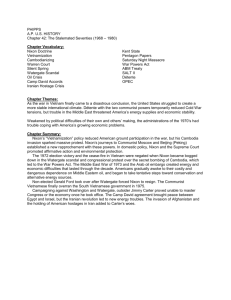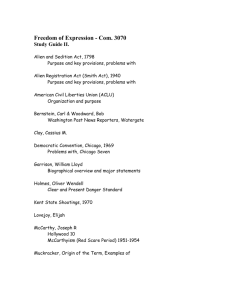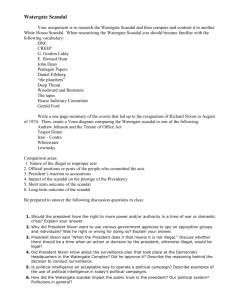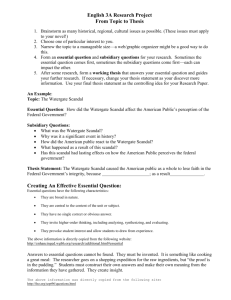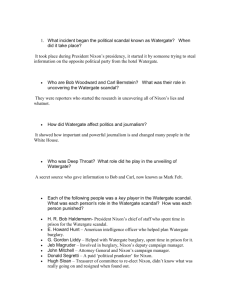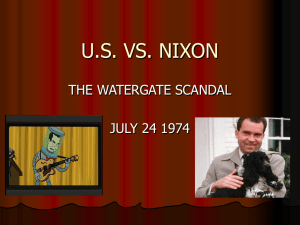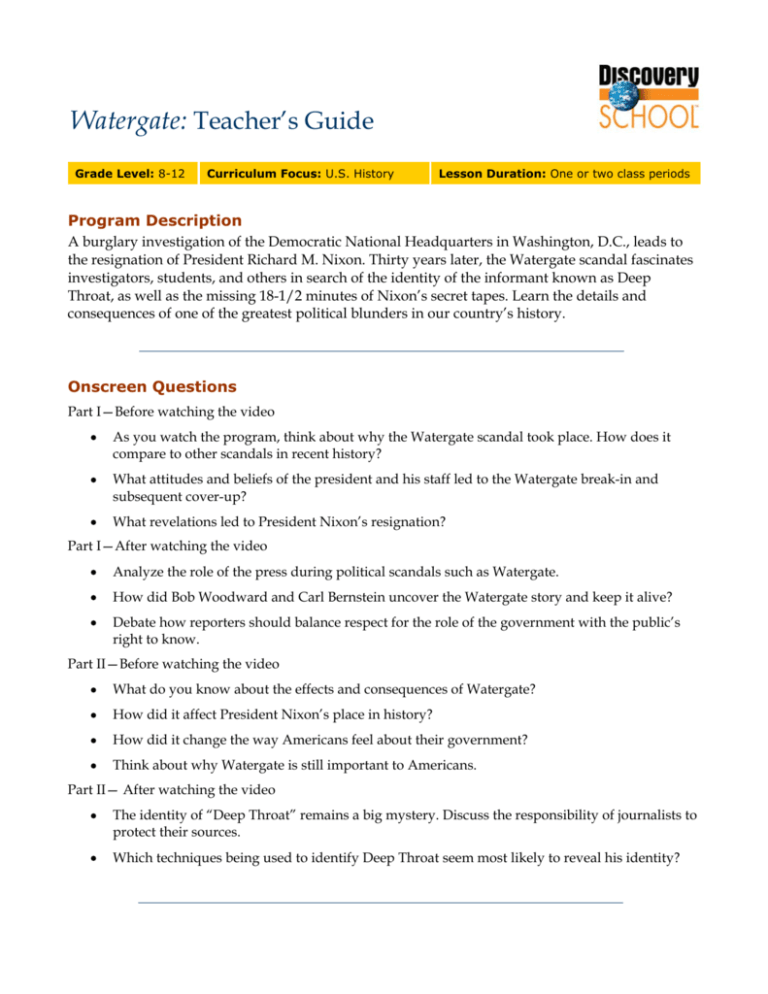
Watergate: Teacher’s Guide
Grade Level: 8-12
Curriculum Focus: U.S. History
Lesson Duration: One or two class periods
Program Description
A burglary investigation of the Democratic National Headquarters in Washington, D.C., leads to
the resignation of President Richard M. Nixon. Thirty years later, the Watergate scandal fascinates
investigators, students, and others in search of the identity of the informant known as Deep
Throat, as well as the missing 18-1/2 minutes of Nixon’s secret tapes. Learn the details and
consequences of one of the greatest political blunders in our country’s history.
Onscreen Questions
Part I—Before watching the video
•
As you watch the program, think about why the Watergate scandal took place. How does it
compare to other scandals in recent history?
•
What attitudes and beliefs of the president and his staff led to the Watergate break-in and
subsequent cover-up?
•
What revelations led to President Nixon’s resignation?
Part I—After watching the video
•
Analyze the role of the press during political scandals such as Watergate.
•
How did Bob Woodward and Carl Bernstein uncover the Watergate story and keep it alive?
•
Debate how reporters should balance respect for the role of the government with the public’s
right to know.
Part II—Before watching the video
•
What do you know about the effects and consequences of Watergate?
•
How did it affect President Nixon’s place in history?
•
How did it change the way Americans feel about their government?
•
Think about why Watergate is still important to Americans.
Part II— After watching the video
•
The identity of “Deep Throat” remains a big mystery. Discuss the responsibility of journalists to
protect their sources.
•
Which techniques being used to identify Deep Throat seem most likely to reveal his identity?
Watergate: Teacher’s Guide
2
Lesson Plan
Student Objectives
•
Discuss the primary events of the Watergate crisis.
•
Conduct an interview with a Watergate-era adult.
•
Present a summary of their interview.
Materials
•
Watergate video and VCR
•
Computer with Internet access
•
Print resources about Watergate
•
Audio or video recorder
•
Paper, pens
Procedures
1. Review the information about Watergate featured in the video by asking students these
questions:
•
What was Watergate?
•
Why was the scandal called Watergate?
•
What precipitated the scandal? How did it end?
•
Who were the primary people involved in the event?
•
Who broke the story to the American public?
•
Who was “Deep Throat”?
•
What evidence existed that Nixon was guilty?
•
What was the most incriminating aspect of the White House tapes?
2. Explain that the students’ assignment is to interview someone who was an adult at the time of
the Watergate scandal (1972-1974). Students should try to get a personal look at how the events
of Watergate changed the way the public viewed the U.S. government.
3. Tell students that their interviews may be brief (about 30 minutes). Their questions must allow
an interviewee to give opinions and share memories and feelings. They must avoid questions
that elicit a one-word answer. Also, students should find out about their interviewee by asking
the following questions:
•
How old were you at the time of the Watergate scandal?
•
Where did you live?
Published by Discovery Education. © 2005. All rights reserved.
Watergate: Teacher’s Guide
•
What were you doing? (examples: college student, owned a business, took care of
children)
•
Had you voted for Nixon? Did your opinion of Nixon change when the scandal broke?
•
Describe your feelings toward the government and politics before and after the
Watergate scandal.
3
4. Have students work individually to write their own lists of questions. If they would like
additional information, direct them to the following Web sites:
•
Washingtonpost.com: Watergate
http://www.washingtonpost.com/wp-srv/national/longterm/watergate/front.htm
•
Encyclopedia Americana: Watergate
http://gi.grolier.com/presidents/ea/side/watergte.html
•
Watergate Info
http://watergate.info/
5. Have students work in pairs to interview their partners, who will critique the questions. Are the
questions clear? Are they asked in a logical order? Do they provoke thoughtful answers? Did
the interview take longer than 30 minutes?
6. Review techniques for conducting an interview:
•
Identify an appropriate person to interview. Ask your relatives, neighbors, or other
members of your community.
•
Introduce yourself, if necessary, and explain the purpose of your interview.
•
Schedule the interview at a convenient time for the interviewee. Explain that it will take
about 30 minutes.
•
Get permission to use an audio or video recorder during the interview.
•
Arrive on time for the interview.
•
Be familiar with your questions, but it is OK to read from your list.
•
Take notes during the interview, even if you are using an audio or video recorder.
•
Be patient and polite. Do not argue.
•
Refer to your question list, but be prepared to ask follow-up questions in response to the
subject’s answers.
•
Review your notes right after the interview. Then write a short summary. Contact your
subject quickly if you have additional questions.
•
Very soon after the interview, thank your subject by phone or mail for taking time to
talk with you. Offer a copy of your interview.
Published by Discovery Education. © 2005. All rights reserved.
Watergate: Teacher’s Guide
4
7. Once students have completed their interviews, they should review their notes to find the
highlights to create a brief presentation. They will summarize the interview and include at least
two direct quotes from their subject.
8. Discuss the results of the interviews. What surprised students most? What were similarities and
differences among the interviewees? What do students see as the most significant outcome of
Watergate? What did they learn that they might not have learned from a book or news article?
Assessment
Use the following three-point rubric to evaluate students’ work during this lesson.
•
3 points: Students were highly engaged in class discussions; created clear and detailed
interview questions, reflecting an exceptional understanding of the events of Watergate;
presented a well-organized summary supported with details and two direct quotes.
•
2 points: Students participated in class discussions; created adequate interview questions,
reflecting an understanding of the events of Watergate; presented a summary with a few
details and one direct quote.
•
1 point: Students participated minimally in class discussions; created an incomplete list of
interview questions, reflecting little or no understanding of the events of Watergate;
presented a disorganized summary without adequate details and included no direct quotes.
Vocabulary
Deep Throat
Definition: The mysterious White House informant who provided crucial facts to Washington
Post reporters Bob Woodward and Carl Bernstein
Context: The three men who know the identity of Deep Throat have vowed not to reveal his
name until he is deceased.
resign
Definition: To give up an office or position
Context: Due to the results of the Watergate scandal, President Richard Nixon resigned on
August 8, 1974.
scandal
Definition: A crime or act that offends accepted moral standards; an act that disgraces those
associated with it
Context: The Watergate scandal changed the way the public viewed the United States
government.
Watergate
Definition: A political scandal that occurred between 1972 and 1974 and ended with the
resignation of the U.S. President Richard Nixon
Published by Discovery Education. © 2005. All rights reserved.
Watergate: Teacher’s Guide
5
Context: The Watergate scandal began when burglars broke into the Democratic Party’s
National Committee offices at the Watergate Hotel in Washington, D.C..
Academic Standards
Mid-continent Research for Education and Learning (McREL)
McREL's Content Knowledge: A Compendium of Standards and Benchmarks for K-12 Education
addresses 14 content areas. To view the standards and benchmarks, visit link:
http://www.mcrel.org/compendium/browse.asp
This lesson plan addresses the following national standards:
•
History—U.S. History: Understands developments in foreign policy and domestic politics
between the Nixon and Clinton presidencies
•
Language Arts—Viewing: Uses viewing skills and strategies to understand and interpret
visual media; Listening and Speaking: Uses listening and speaking strategies for different
purposes
The National Council for the Social Studies (NCSS)
NCSS has developed national guidelines for teaching social studies. To become a member of NCSS,
or to view the standards online, go to http://www.socialstudies.org
This lesson plan addresses the following thematic standards:
•
Time, Continuity, and Change
•
Individuals, Groups, and Institutions
•
Power, Authority, and Governance
Support Materials
Develop custom worksheets, educational puzzles, online quizzes, and more with the free teaching tools
offered on the Discoveryschool.com Web site. Create and print support materials, or save them to a
Custom Classroom account for future use. To learn more, visit
•
http://school.discovery.com/teachingtools/teachingtools.html
Published by Discovery Education. © 2005. All rights reserved.

